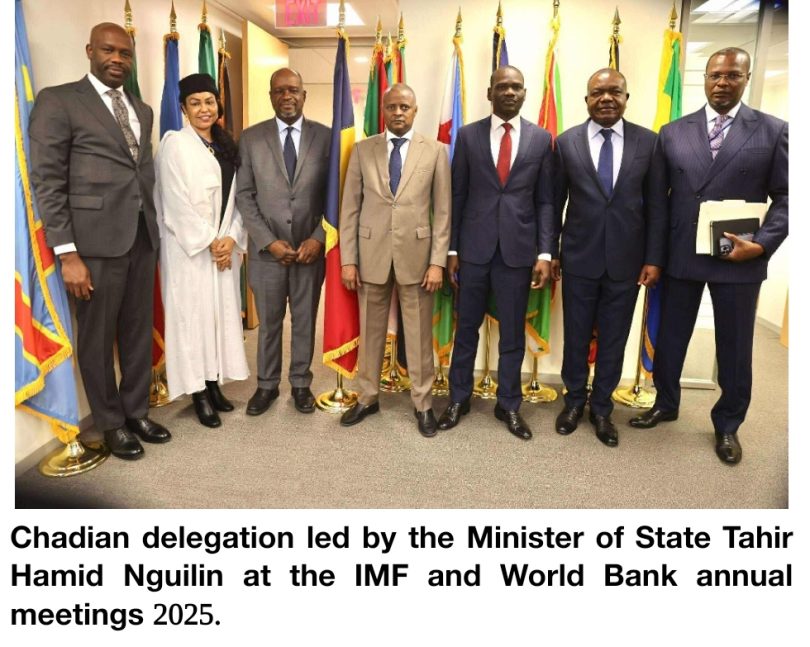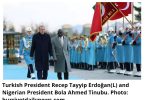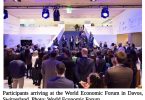Amid the high-level dialogues and macroeconomic forecasts that defined the 2025 Annual Meetings of the International Monetary Fund and the World Bank Group in Washington, the Republic of Chad conducted a strategic, intensive series of engagements.
Led by the Minister of State, Minister of Finance, Budget, Economy, Plan and International Cooperation, Mr. Tahir Hamid Nguilin, the Chadian delegation’s mission was clear: to solidify international partnerships, demonstrate tangible progress on structural reforms, and build definitive momentum for the forthcoming “Chad Connection 2030” National Development Plan (NDP) financing roundtable.
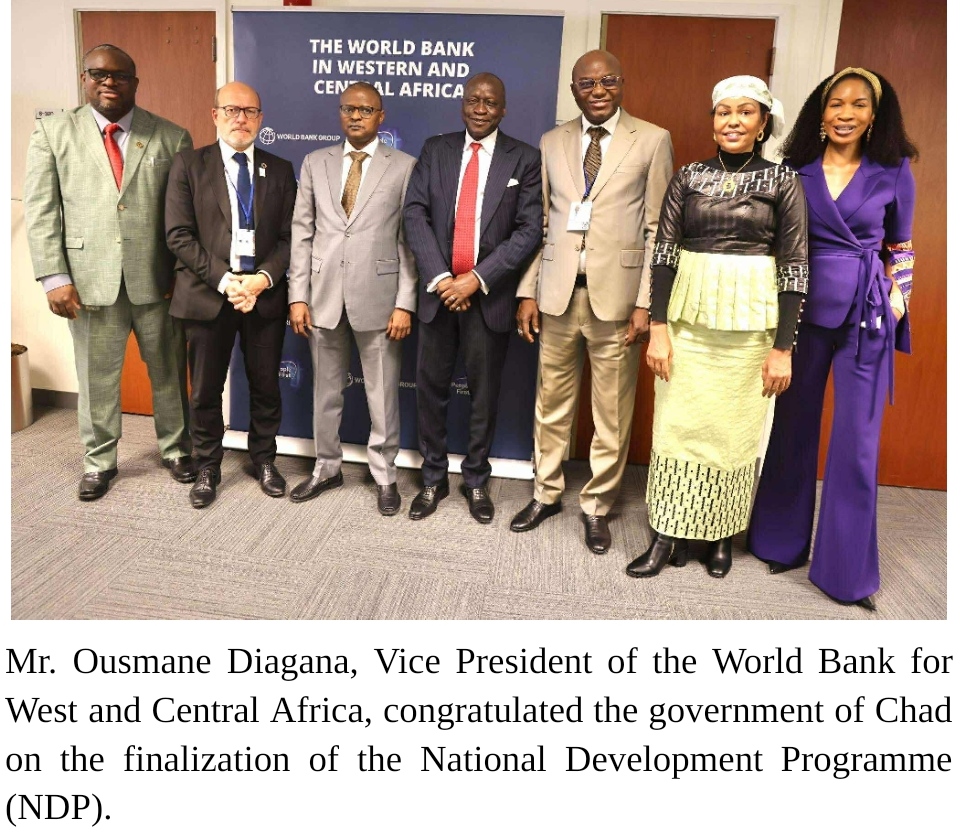
The delegation, which included Minister of Commerce and Industry, Mr. Guibolo Fanga Mathieu, Minister of Energy and Water Kanabe Passalet Marcelin and the Minister Delegate in charge of the Economy, Planning and International Cooperation Mrs. Fatima Haram Acyl, methodically engaged the leadership of the Bretton Woods institutions, bilateral partners, and multilateral development banks, securing critical support for the country’s economic and development agenda.
World Bank Commits to NDP Vision, Praises Portfolio Performance.
The partnership between Chad and the World Bank Group was crucially important and emerged as a central pillar of the week’s discussions. In a significant portfolio review meeting, Mrs. Clara De Sousa, World Bank Director of Operations for West and Central Africa, and Mr. Farouk Mollah Banna, Resident Representative in Chad, lauded the Chadian government’s performance.
A key metric highlighted was Chad’s exceptional disbursement rate of 26.8%, the second highest in the West and Central African subregion. This figure was praised by the Bank as a clear indicator of the country’s capacity for effective project implementation and absorption.
The discussions confirmed new World Bank support for critical areas aligned with the “Chad Connection 2030” plan, including water management, climate resilience, and private sector development. This commitment was powerfully illustrated by a dedicated meeting on the “Almé Djah” Project for Water Security. This new $100 million initiative, financed by the Bank, aims to ensure equitable access to drinking water, modernize infrastructure, and strengthen community resilience to climate change.
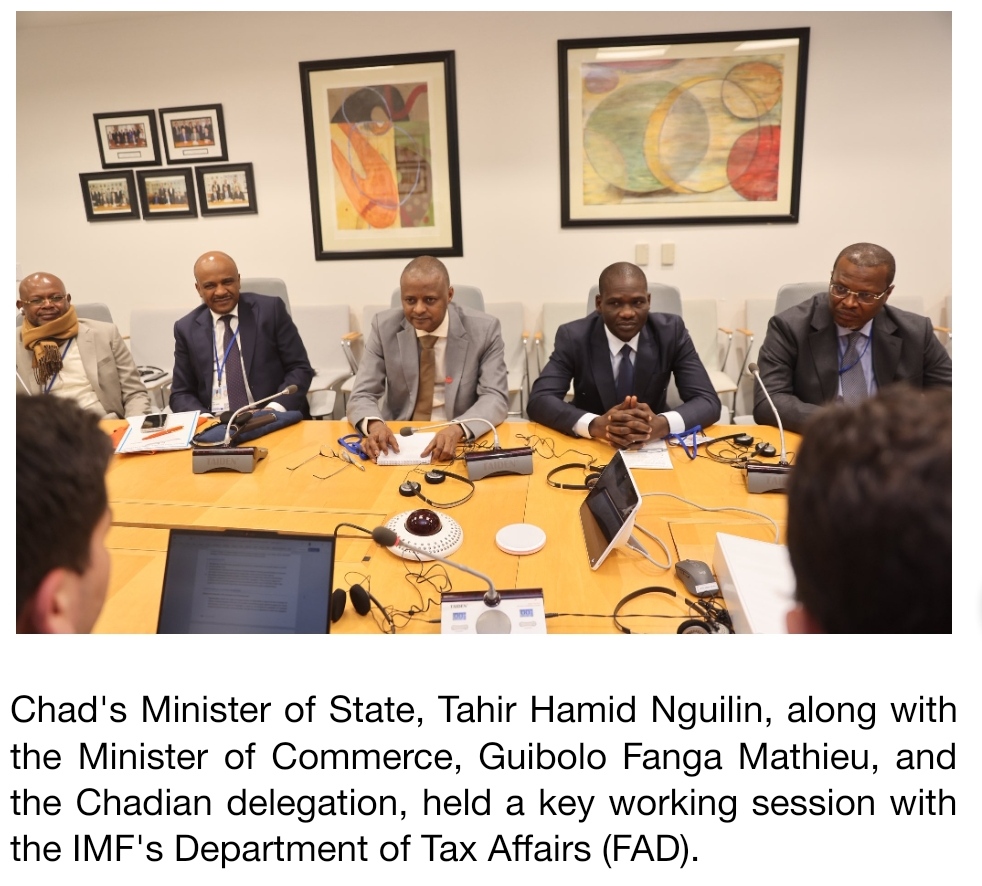
The strength of this partnership was further cemented when Mr. Ousmane Diagana, Vice President of the World Bank for West and Central Africa, congratulated the government on the finalization of the NDP. He reaffirmed the Bank’s commitment to help mobilize the necessary resources and confirmed its high-level participation in the Abu Dhabi roundtable, scheduled for November 10 and 11, 2025.
IMF Partnership Strengthened on Reforms and Governance
On the International Monetary Fund side, the dialogue focused on the steady progress of Chad’s economic program. The delegation held a high-level meeting with Mr. Abebe Aemro Selassie, Director of the IMF Africa Department, to review the ongoing Expanded Credit Facility (FEC) programme and the Fund’s continued support for the government’s economic and financial reforms.
This was followed by a productive session with the IMF’s Department of Tax Affairs (FAD) focused on the technical architecture of the reform. Discussions covered the digitalization of the tax system, the implementation of property tax, and the management of tax expenditures, with the FAD reaffirming its technical support to bolster domestic revenue mobilization.
In a key meeting with IMF Deputy Managing Director Mr. Nigel Clarke, the Fund praised the progress Chad has made and its commitment to pursuing reforms. Mr. Clarke also specifically commended Chad for its significant efforts in welcoming refugees, a testament to the country’s critical role in regional stability. In each of these meetings, Minister Nguilin formally extended invitations to the Abu Dhabi roundtable, urging the Fund’s senior management to support the country’s long-term development vision.
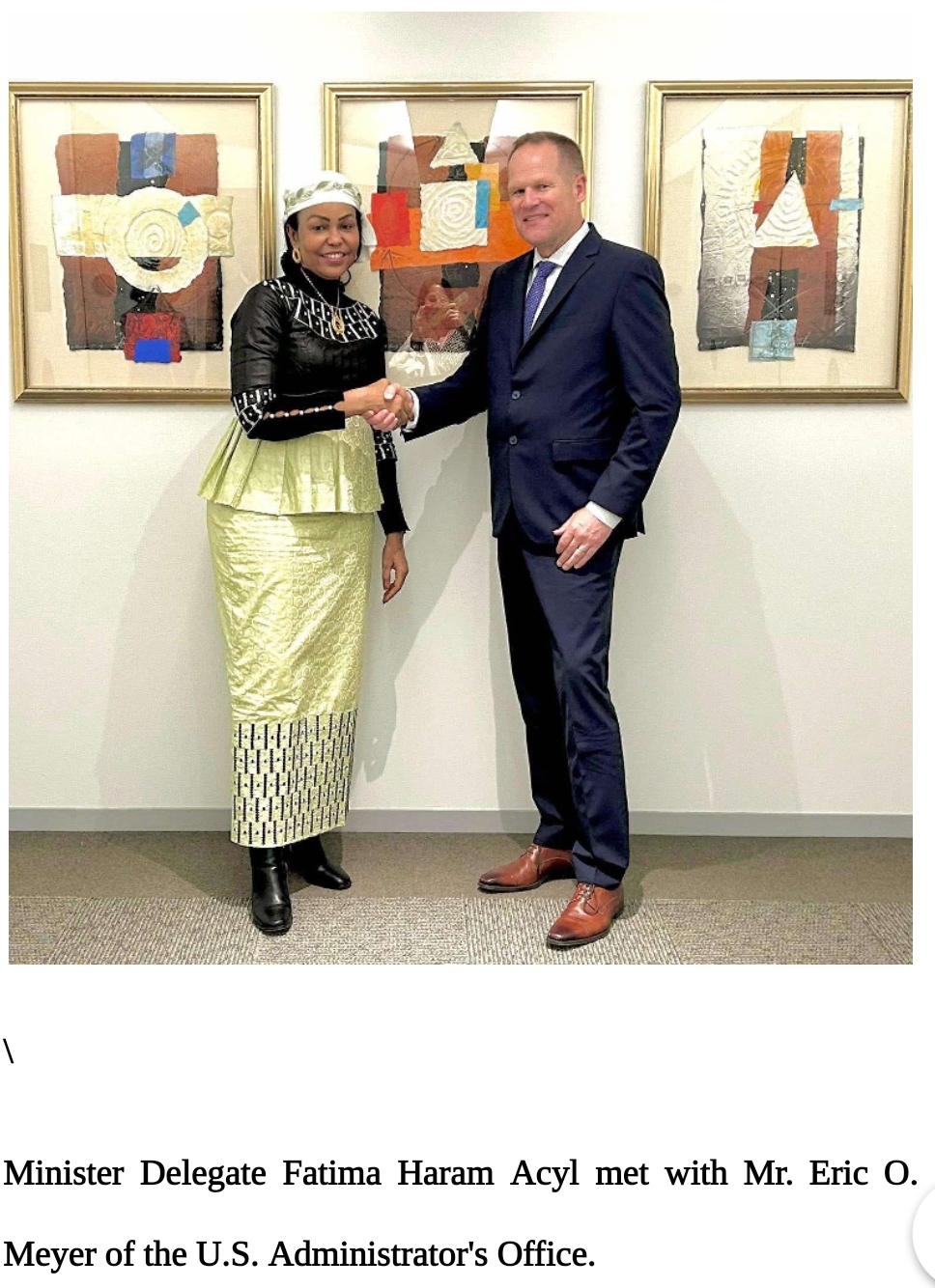
Mobilizing Multilateral and Private Sector Support
A cornerstone of the delegation’s strategy was engaging the International Finance Corporation (IFC), the World Bank Group’s private sector arm. The IFC hailed the government’s reforms to improve the business climate and announced a landmark decision: it will double its investment portfolio in Chad from $100 million to $200 million by 2026. Already active in telecommunications, energy, and agriculture, the IFC also confirmed its participation in the “Chad Connection 2030” roundtable.
This focus on the private sector was reinforced in a technical meeting with World Bank and IFC teams, which centered on reforms to trade justice, corporate competitiveness, and the dematerialization of procedures to boost investment.
The momentum continued with the African Development Bank (AfDB/BAD). Minister Nguilin first met with Mr. Régis Lakoué Dérand, the AfDB Administrator for Chad, who sought guidance on national priorities, particularly in the private sector and energy. In a subsequent high-level meeting, the President of the AfDB, Mr. Sidi Ould Tah, reaffirmed the institution’s commitment to accompany Chad’s priorities and confirmed the Bank’s participation in the Abu Dhabi financing event.
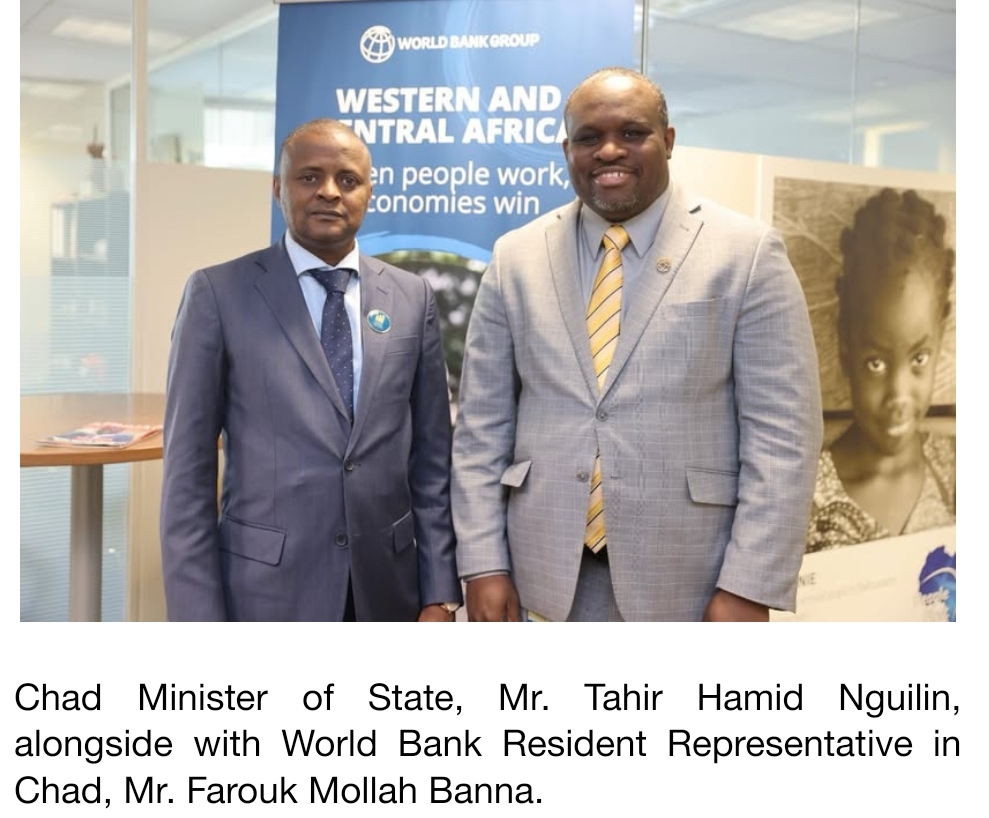
Broadening the Coalition of Partners
The Chadian delegation leveraged the Washington meetings to engage a wide array of bilateral and institutional partners. Productive exchanges were held with:
- France: Mr. Buisse, the French Administrator at the IMF and World Bank, reaffirmed France’s full support for Chad’s reforms and discussed the participation of French companies in the Abu Dhabi roundtable.
- United States: Mrs. Fatima Haram Acyl met with Mr. Eric O. Meyer of the U.S. Administrator’s Office, securing reaffirmation of U.S. support for Chad’s programs and the “Chad Connection 2030” plan.
- French Development Agency (AFD): Minister Nguilin met with Mr. Rémy Rioux, Director General of the AFD, to strengthen their ongoing development partnership.
- Islamic Development Bank (IDB): The Minister of State Tahir Hamid Nguilin held a cordial exchange with the President of the IDB Group, Dr. Muhammad Al Jasser, reinforcing the strong ties between the institution and Chad.
Advancing Sector-Specific and Thematic Agendas
Beyond the headline agreements, the week was marked by technical working sessions focused on the NDP’s core pillars. The delegation, including Minister of Energy and Water Mr. Passalet Kanabé Marcelin, met with the World Bank and IFC experts to discuss access to electricity and the transition to renewable energy. A separate meeting with World Bank sector directors for agriculture focused on a new, innovative scheme to improve fertilizer availability and integrate all stakeholders into Chad’s cotton production chain.
The delegation also participated in a technical session on the 2024 Country Policy and Institutional Assessment (CPIA). While the assessment noted progress in Chad’s overall score, a commitment was made to improve reporting to ensure future assessments fully reflect the depth and breadth of reforms implemented.
Represented by Minister Delegate Fatima Haram Acyl, Chad also participated in the 2025 African Caucus Meeting. This platform enabled African governors to speak with one voice, advocating for resilient infrastructure, human capital, and a green transition, ensuring that Chad’s priorities aligned with the continent’s unified agenda.
As the meetings concluded, Minister of State Tahir Hamid Nguilin expressed his satisfaction with the quality of the exchanges. He particularly hailed the exemplary collaboration and leadership of the World Bank Resident Representative, Mr. Farouk Mollah Banna, as a symbol of the mutual trust that now defines the partnership. The Chadian delegation departed Washington having not only secured tangible commitments but also having successfully positioned the “Chad Connection 2030” roundtable as the essential next step in the international community’s shared commitment to a resilient and prosperous Chad.


